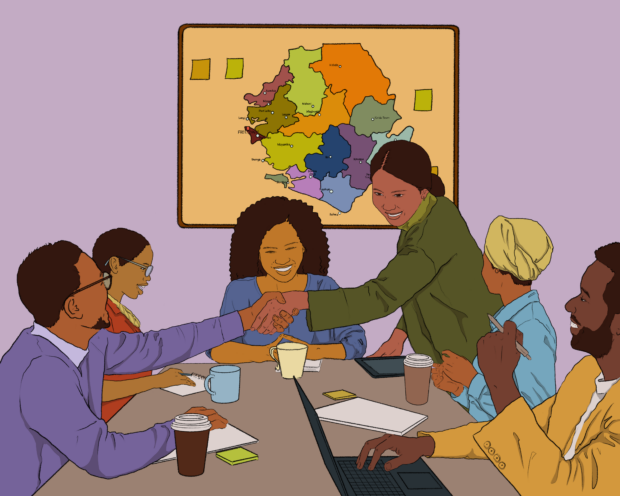Data governance is no longer a technical or bureaucratic concern—it is a societal one. Africa’s rapid digitalisation, fuelled by mobile connectivity, e-government initiatives, and the rise of artificial intelligence (AI), has created both opportunities and risks. While data-driven innovations promise to enhance service delivery and economic growth, they also raise critical questions about privacy, security, and equity. Without inclusive governance models, there is a real risk that marginalised communities—particularly women, rural populations, and low-income groups—will be left behind.
This is where civil society organisations step in. In Africa, they are playing a dynamic and multi-dimensional role in shaping the region’s data governance landscape. Their contributions span policy advocacy, watchdog functions, community empowerment, and digital literacy initiatives. These efforts are critical for building trust in data systems and ensuring that governance frameworks are both ethical and effective.
Civil society helps influence national and regional data governance frameworks.
As the region embraces the opportunities of a data-driven future, the need for robust, inclusive, and ethical data governance frameworks has never been more urgent. Civil society organisations (CSOs) are emerging as pivotal actors in this space, bridging the gap between policymakers, the private sector, and the public. Their role in advocating for transparency, accountability, and inclusivity in data governance is not only transformative but essential for ensuring that the benefits of digital transformation are equitably shared across Africa.
For example, in Uganda, the Collaboration on International ICT Policy for East and Southern Africa (CIPESA), UN Global Pulse Uganda, and Unwanted Witness have been a leading voice in advocating for data justice, privacy, and protection laws in the country. Their efforts contributed to the development of Uganda’s Data Protection and Privacy Act (2019), which sets standards for the collection, storage, and use of personal data. They have also played a key role during consultations shaping Uganda’s national Data Strategy.
Similarly, in Kenya, the Kenya ICT Action Network (KICTANet), Article 19, and Pollicy have played a key role in shaping the country’s data governance framework. Through policy dialogues, stakeholder consultations, and research, CSOs in Kenya have influenced the implementation of Kenya’s Data Protection Act (2019) and its alignment with global standards such as the African Union’s Data Policy Framework.
These examples underscore the critical role of CSOs in ensuring that data governance frameworks are not only legally robust but also aligned with human rights principles and the needs of citizens.
Civil society helps ensure ethical and responsible data use.
When data becomes increasingly central to decision-making, the risk of misuse, discrimination, and exploitation grows. CSOs can act as watchdogs, monitoring how governments and private sector entities collect, use, and share data.
For example, in Tanzania, the Tanzania Data Lab (dLab) has been at the forefront of advocating for ethical AI and data use, particularly in the context of public service delivery. Their work has highlighted the risks of algorithmic bias and the need for transparency in data-driven decision-making.
In Zambia, several civil society organisations (CSOs) are actively working individually—and in tandem—to protect and advance digital rights. For example, The Zambian Cyber Security Initiative, a leading non-profit organisation, is promoting digital safety, digital rights, and advocating for stronger digital rights frameworks and ethical AI deployment across the country. On the other hand, Panos Institute Southern Africa is working towards increasing access to information and communication by poor and marginalised communities using ICTs. And, in Rwanda, the Internet Society Rwanda Chapter has been actively involved in monitoring data practices in the health sector, ensuring that sensitive health data is used responsibly and in compliance with privacy regulations.
These efforts are critical for building public trust in data systems and ensuring that governance frameworks protect the rights of all citizens.
Civil society helps drive digital and data literacy.
One of the most significant contributions of CSOs is their work in building digital and data literacy. This is through empowering communities with the knowledge and skills to understand how their data is used. This therefore makes CSOs foster a culture of accountability and participation.
For instance, Pollicy, a has implemented digital literacy programs in Uganda that educate citizens and women leaders on data privacy, digital rights, and the importance of data governance. These initiatives have empowered individuals to engage meaningfully in governance discussions and hold institutions accountable. In Tanzania, the dLab has launched community-driven data literacy initiatives that target underserved populations, particularly women and youth.
These efforts ensure that people are informed, empowered, and able to actively participate in shaping the data systems that affect their lives.
Civil society plays a key role in ensuring no one is left behind.
To build a robust and inclusive data governance ecosystem in Africa however, collaboration between CSOs, governments, the private sector, and development partners is essential.
There are many ways actors could engage in a collaborative approach, for example:
- Governments. Recognise CSOs as equal stakeholders in data governance processes. Integrate their expertise into policy development and implementation and create platforms for meaningful engagement.
- Donors and development agencies. Increase funding for CSO-led initiatives, particularly in the areas of policy advocacy, digital literacy, and data protection. Ensure that funding is sustainable and aligned with local priorities.
- Private sector. Partner with CSOs to develop ethical data practices and ensure that innovation is balanced with rights-based protections. Collaborate on initiatives that promote transparency and accountability in data use.
- CSOs. Continue to build coalitions and networks that amplify their impact. Share best practices and lessons learned across the region to strengthen collective advocacy efforts.
These efforts are important in ensuring that data governance systems are inclusive by design—centring the voices, rights, and realities of all people, especially those that have historically been excluded from digital progress.
The need for inclusive, transparent, and participatory data governance models in Africa cannot under looked. CSOs have been at the forefront of this, advocating for equitable policies, empowering communities, and holding institutions accountable. However, their impact will be even greater with stronger partnerships and greater collaboration.
Now is the time for governments, businesses, and development partners to join forces with CSOs in shaping a responsible digital future. This is therefore ensuring that data governance in Africa is not only about regulation but about empowerment, equity, and trust. Let us seize this moment to build a digital ecosystem that serves all Africans, leaving no one behind.







